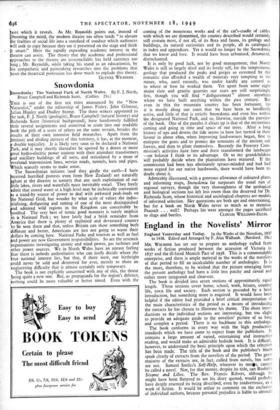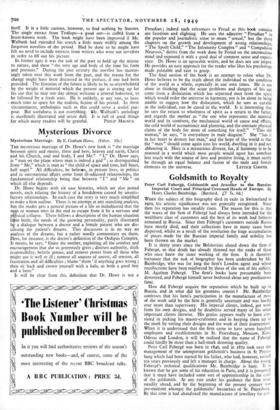England in the Novelists' Mirror
England Yesterday and Today. In the Works of the Novelists, 1837 to 1938. Edited and Arranged by F. Alan Walbank. (Batsford. 15s.)
MR. WALBANK has set out to prepare an anthology culled from works of fiction produced between the accession of Victoria in 1837 and the ill-fated Munich Pact of 1938. This is a commendable enterprise, and there is ample material in the works of the novelists of that period to fill an incalculable number of anthologies. It is the more, therefore, to be wished that the picture emerging from the present anthology had been a little less patchy and casual and rather more integrated and clear-cut. The book is divided into seven sections of approximately equal length. Those sections cover home, school, work, leisure, country life, toms life and society. Each section is preceded by a brief introduction, but something more is required. It would have been helpful if the editor had provided a brief critical interpretation of the main characteristics of the period as a means of introducing the extracts he has chosen to illustrate his theme. The short intro- ductions to the individual sections are interesting, but too slight to provide an adequate guide to the novelists' picture of so long and complex a period. There is no backbone to this anthology. The book conforms in every way with the high production standards which we have come to expect from the publishers. It contains a large amount of varied, entertaining and instructive reading, and would make an admirable bedside book. It is difficult. however, to understand the basic principle upon which the selection has been made. The title of the book and the publisher's blurt, speak clearly of extracts from the novelists of the period. The great majority of the extracts are, in fact, culled from novels, but some arc not. Samuel Smiles's Self-Help, whatever its merits, cannot be called a novel. Nor, for that matter, despite its title, can Ruskin's Sesame and Lilies. The Rev. Francis Kilvert, although he might have been flattered to set his diary quoted, would probaby have deeply resented its being described, even by inadvertence, as a work of fiction. It would be unfair to comment on the exclusion of individual authors, because personal prejudice is liable to obtrude
Itself. It Is a little curious, however, to find nothing by Surtees. The single extract from Trollope—a good one—is culled from a lesser-known work. The book might have been improved if Mr. Walbank had extended his search a little more widely among the forgotten novelists of the period. Had he done so he might have felt no need to include extracts from writers who were not novelists in order to fill out his picture.
In former ages it was the task of the poet to hold up the mirror to nature, and show " the very age and body of the time his form and pressure." During the past century the novelist has increas- ingly taken over this work from the poet, and the reason for the change might have been discussed in the preface, if one had been provided. The historian of the future is likely to be so overwhelmed by the weight of material which the present age is storing up for his use that he may one day almost welcome a general holocaust, to be followed by a fresh start. He is unlikely, at any rate, to have much time to spare for the realistic fiction of his period. In these circumstances, anthologies such as this could serve a useful pur- pose. But usefulness is not everything. Mr. Walbank's anthology is excellently illustrated and never dull. It is full of good things for which many readers will be grateful. PHILIP MAGNUS.















































































 Previous page
Previous page